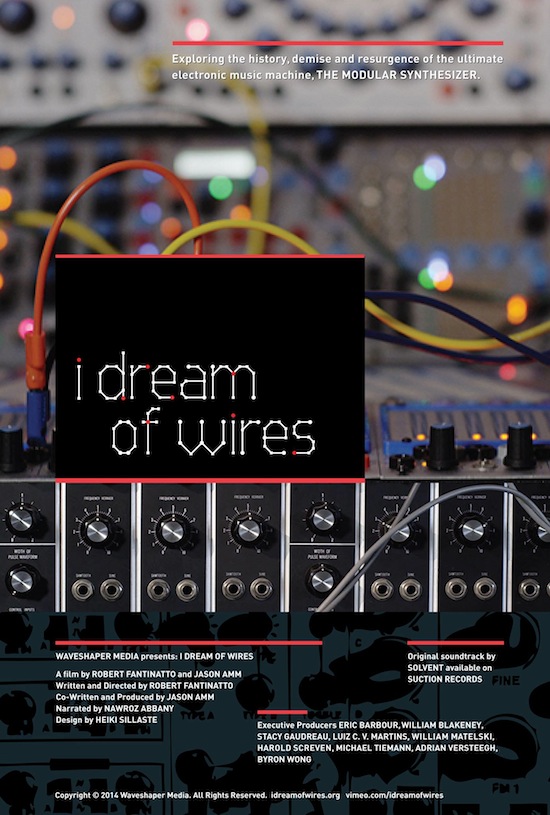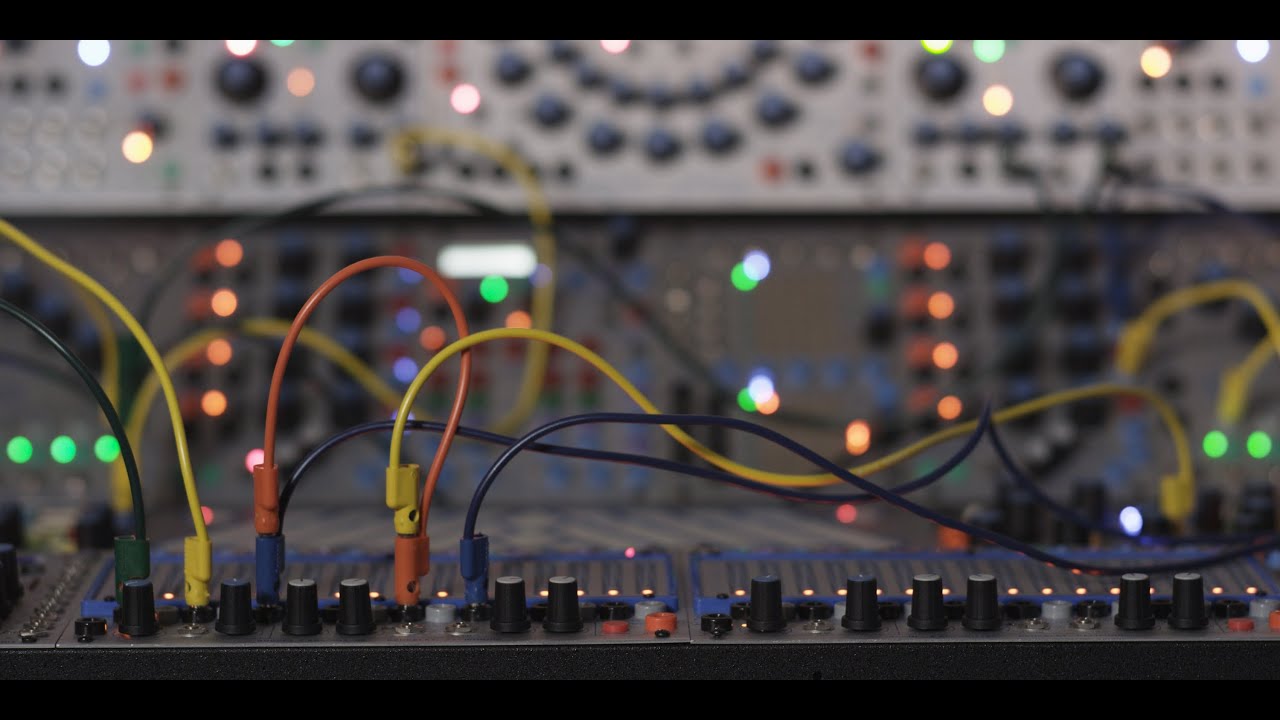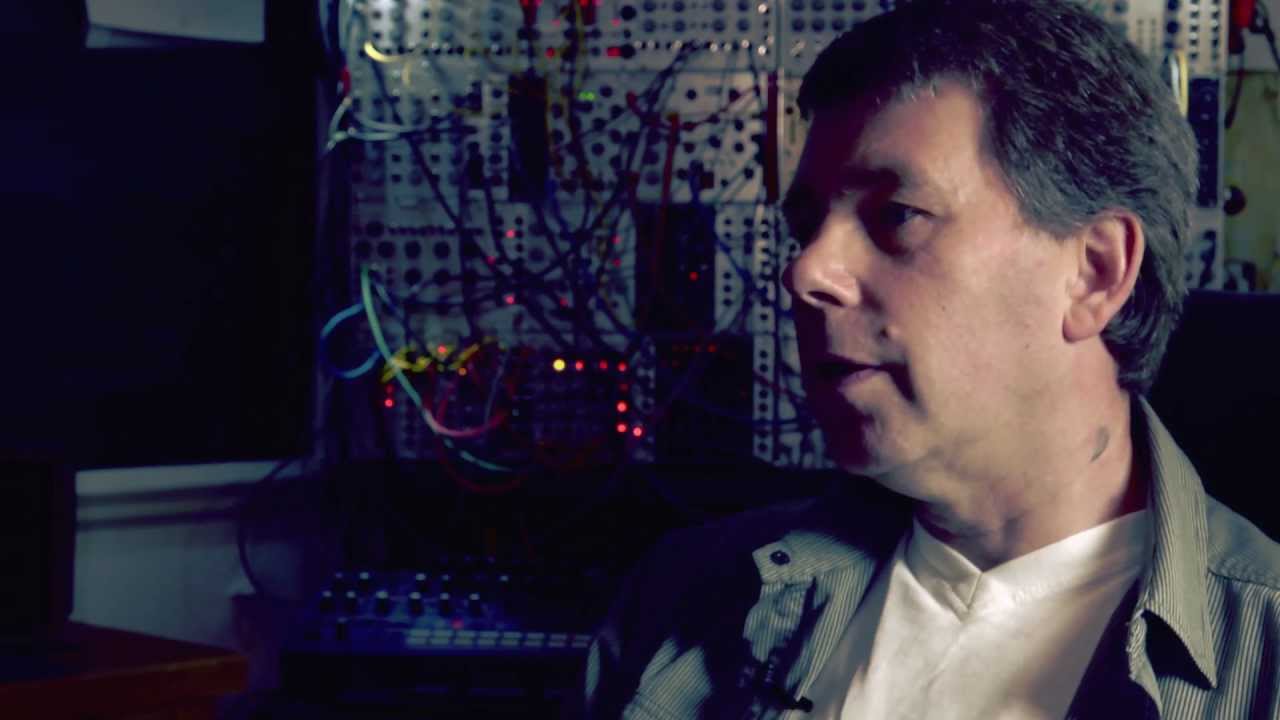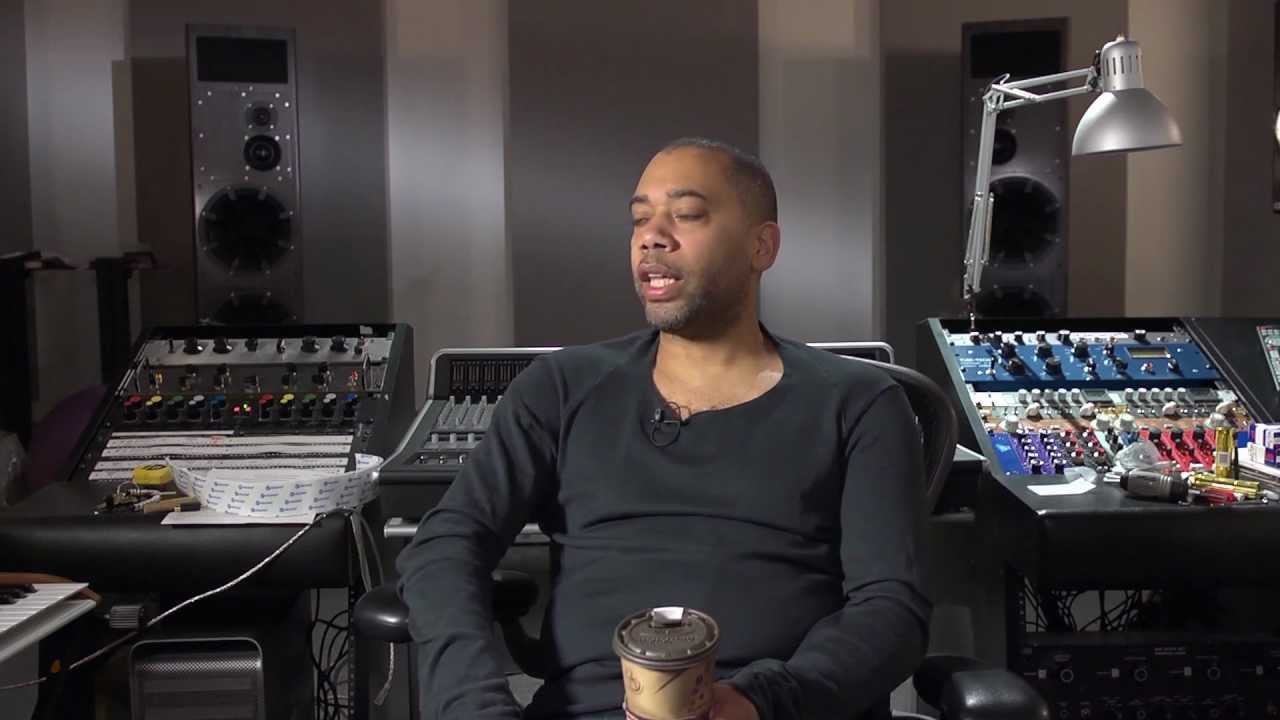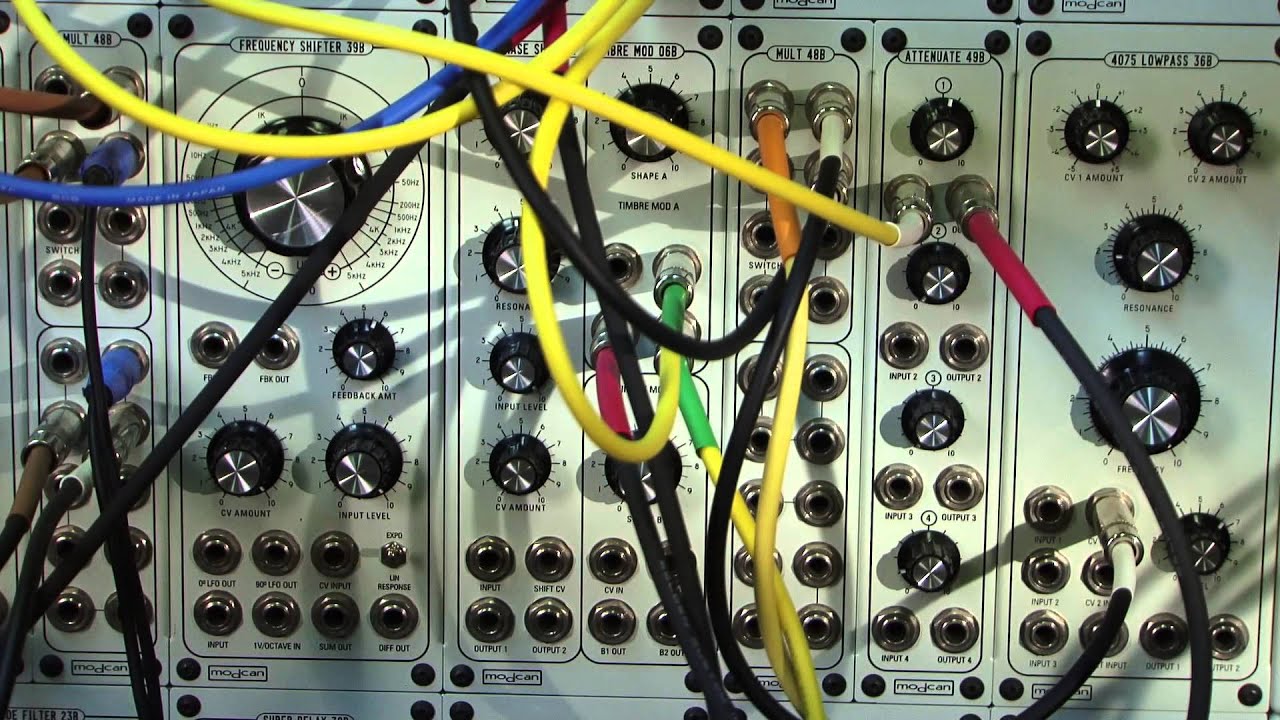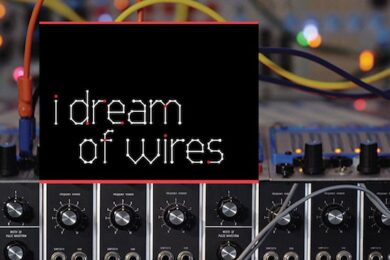As a non-musician, gawping at a large modular synthesiser is an exhilarating but confusing experience: they are an unfathomable cluttered mess of multi-coloured wires, flashing lights, unrecognisable knobs, dials and switches – they are spaceship-like in appearance and alien in their aura. They are so visually exciting that I immediately – like a sticky-fingered child hurtling towards a plug socket with hands outstretched – want to touch everything on them regardless of the consequences. It seems this was a fairly common reaction to witnessing the instrument and several actual musicians felt – and still feel – the same way and have been immersing themselves in the machines since their creation in 1963. Many of these people contribute to I Dream Of Wires, a documentary focused solely on the world of the modular synthesiser.
The film has been doing the rounds for a little while as a behemoth four-hour long ‘Hardcore Edition’ that delves deep into the more technical side of things, this received a Blu-ray release in 2013 but the film has now been trimmed into a more palatable, 90-minute theatrical release. This release will receive its joint UK premiere in Sheffield and London on June 21. The former is being hosted as a one-off screening by Sensoria festival (September 27-October 4) in the underused setting of the Heeley Institute (where your £5 entrance ticket will also swing you a free gin & tonic) and the latter as part of the East End Film Festival in London (June 13-25).
The documentary is not so much a glory days, over-the-shoulder retelling of the instrument in its heyday but a tracing of its history, rise, fall and current resurgence. Inventors and pioneers are interviewed and old-time proponents like Gary Numan, Vince Clarke, Daniel Miller, John Foxx and Chris Carter are all here, perhaps as expected, but newer artists such as Factory Floor, Clark, Luke Abbott and James Holden are also interviewed alongside the perhaps even less predictable faces of artists such as Detroit techno pioneer Carl Craig and underground synth wizard Keith Fullerton Whitman. Aesthetically, modular synthesisers seem as endlessly retro as they do futuristic and I Dream Of Wires seems to use this stylistic foundation as a means to explore more deeply the past, present and future of the unique world of the modular synthesiser.
Jason Amm records and produces as Solvent (Ghostly International Records). He is the film’s producer and he also composed a brand new modular synthesiser soundtrack for the film. We talked to him to find out a little more about the project.
What drew you personally to modular synthesisers as a musician and then to eventually being involved in making this film?
Jason Amm: I’ve been obsessed with synthesisers since the early nineties, when I started buying analogue synths and producing electronic music. Anyone who’s deep into synthesis knows that modular synths are the ultimate, but the vintage systems were always too expensive and hard to come by. About five years ago I noticed that there were several new companies making Doepfer compatible modules, a format now being called Eurorack. The Eurorack scene really started exploding and things were getting so diverse and weird, I became more and more curious. This Eurorack explosion coincided with a shift in the kinds of sounds I was after; I was feeling limited by classic analogue synthesis and wanted to expand my sonic palette, and the new Eurorack stuff seemed the perfect way forward for me. I met I Dream Of Wires‘ director Robert Fantinatto around this time, and when he asked me if I would be interested in creating a soundtrack for his modular synth documentary, it seemed like the perfect excuse to dive deep into Eurorack modular gear. Working on the soundtrack, I kept in touch with Robert and felt really drawn to the film – I had a lot of suggestions and leads for people I thought he should interview, and I just naturally became more and more involved, until we came to the agreement that I should come on board as producer.
If the four-hour ‘Hardcore’ version of the film is "for the modular synth and electronic music fanatics" then who is the 90-minute theatrical release for?
JA: I feel strongly that I Dream Of Wires should appeal to anyone with an interest in electronic music. Even though we are telling the story of the modular synthesiser, it really ended up being a sort of history lesson on how synthesisers, technology and electronic music in general developed from the 1960s to the present. Personally, I’ll watch just about any music documentary, regardless of whether or not I’m into the music, but I couldn’t watch a four-hour film about guitars, for example. The ‘Hardcore Edition’ is too long and a little too tech-y for the average viewer, but we worked hard to make the 90-minute cut informative, but also fun and accessible. This isn’t just a film for synth nerds!
As someone who is both a fan of, and expert in using, modular synthesisers yourself, what did you learn about them through making this film?
JA: For a long time I’d really thought about synthesisers as being something retro, and in my own music production I was a total purist about using strictly vintage analogue synthesisers. I felt like pure analogue synthesiser music was something of a lost art form, which it really was for a time. I would’ve considered modulars the epitome in retro synthesis. Many people still view the modular synthesiser as a retro instrument, and understand the current renewed interest in modular synthesisers as a revival of the past. Through working on I Dream Of Wires, I’ve come to understand that the new modular synthesiser movement is anything but a revival of the past; today the modular synthesiser domain is where you’ll find many of the most cutting-edge musicians, synthesists and instrument designers. The same was true of the original modular synthesiser systems and designers, and the real reason that they went out of favour is because they were too far ahead of their time when they were originally released. So the film really changed my perspective on what modular synthesisers are – now I recognise them as forward-thinking and futuristic.
You interviewed over 100 modular musicians, inventors and enthusiasts. Were there any particular interviews that stood out to you as being particularly or surprisingly interesting or revelatory?
JA: I really found it fascinating to hear from some of the musicians and composers who were using modular synthesisers in the early days, people like Ramon Sender, Bernie Krause and Morton Subotnick, just to get a sense of how difficult it was to open peoples’ minds to the sound and functionality of synthesisers, how new and foreign the sound and the concepts were. On a personal level, I had a great time indulging myself with some nerdy synth and production questions with some of my synth heroes like Daniel Miller, Vince Clarke and cEvin Key.
What did you feel were some of the strongest consistencies and contradictions (if there were any) amongst the huge number of people you interviewed in their approach to modular synthesisers?
JA: I think it takes a certain type of obsessive personality to get into modular synthesisers, and this definitely seemed to be a consistent trait amongst the people we interviewed.
Were there any artists you would have loved to have interviewed for the film but couldn’t?
JA: It would have been great for the film it we could’ve interviewed Don Buchla and Wendy Carlos. Buchla agreed but turned out to be impossible to pin down, while Carlos flatly refused. On a personal level, it would have been amazing to interview Kraftwerk, and even more so, Aphex Twin. Aphex Twin would have been the ultimate, for sure.
Are there any particular artists or groups you feel, personally, have done extraordinary things with the modular synthesiser? Or any personal favourite compositions made over the years using them?
JA: I think James Holden’s The Inheritors album does a great job of exploiting the random and chaotic aspects of modular synthesis improvisation, and it adds a very organic, earthy quality to the record. I also admire Sean McBride’s use of modular synthesis in his Martial Canterel and Xeno and Oaklander projects. Going back further, I am totally blown away by some of the synthesis heard on Japan’s later albums, which was largely done on a Roland System 700 modular – Ghosts is a great example.
Do you think there are any instruments or software being created right now with enough personality and intrigue to warrant an entire four-hour documentary being made on them in the years to come?
JA: It would definitely be difficult to come by another music instrument community that’s as varied and passionate as the modular synthesiser scene.
You composed the soundtrack for the film. Can you tell us a little about how you approached that and did you feel any sense of pressure soundtracking a film that in essence should be the definitive cinematic statement on that particular instrument and which also contains many of the great masters and innovators of the instrument?
JA: [laughs] When you put it that way I suppose I should’ve felt some pressure, but I didn’t really. I did set a strict rule for the album that it was to be made with nothing but modular synthesisers: no drum machines, no hard-wired synths, no samples, every sound made from scratch using modulars. It was an interesting process because modular synthesisers were a brand new tool for me, and I was discovering new forms of synthesis during the process, and making an effort to incorporate what I was learning into the music. I just set about making a body of music that was created with modular synthesisers, and I found myself getting so many great sounds and ideas out of the instruments, I just followed my instincts and made the kind of music I wanted to hear. I wanted to make music that contained melodic and accessible elements, but also contained these complex, strange sounds that only a modular synthesiser can produce. I think working these crazy, often ugly sounds into a piece of melodic music creates an appealing contrast that was an important point to demonstrate.
What do you think the future holds for modular synthesisers and similar analogue instruments?
JA: There’s been such an explosion of new voices and new ideas coming into synthesis through this recent modular synthesiser resurgence, I feel it’ll take a while to really get to grips with all of the innovation that’s happened in the past five years or so. I wouldn’t even want to try to predict where it’s going – it’s more exciting to just watch it unfold. It was such a pleasure to be able to be a part of I Dream Of Wires and to document this resurgence just as it was really beginning to explode.
Head to I Dream Of Wires’ website for full details of the upcoming screenings

